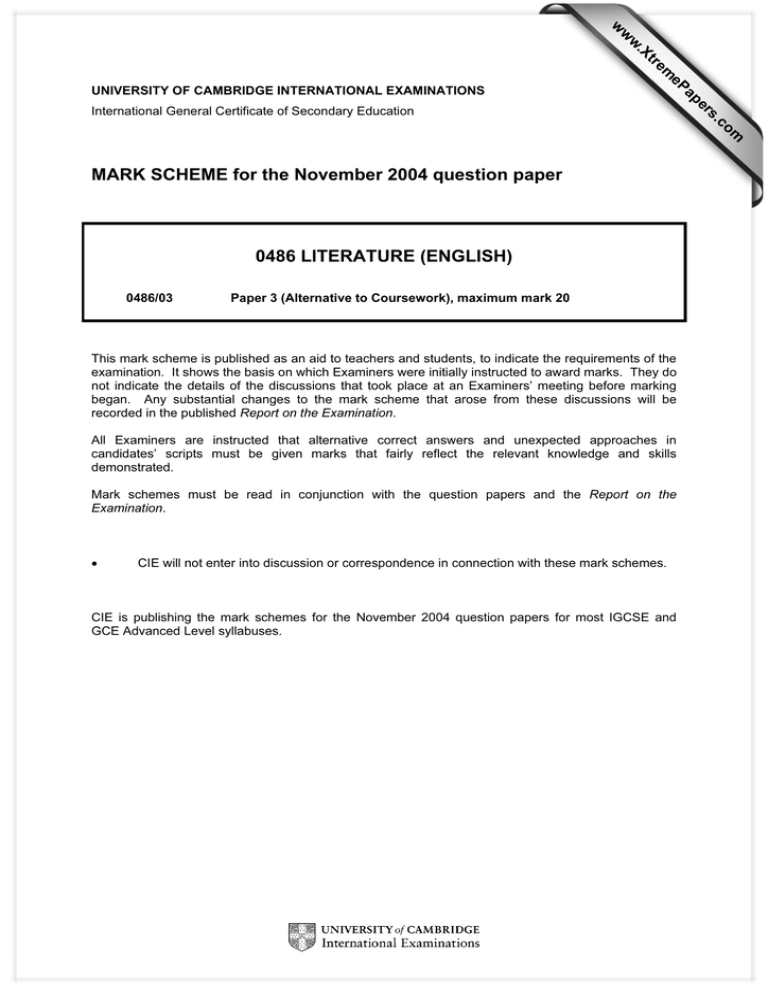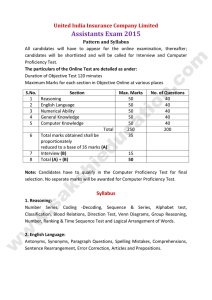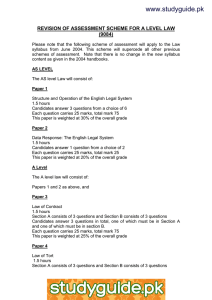www.XtremePapers.com
advertisement

w w ap eP m e tr .X w UNIVERSITY OF CAMBRIDGE INTERNATIONAL EXAMINATIONS om .c s er International General Certificate of Secondary Education MARK SCHEME for the November 2004 question paper 0486 LITERATURE (ENGLISH) 0486/03 Paper 3 (Alternative to Coursework), maximum mark 20 This mark scheme is published as an aid to teachers and students, to indicate the requirements of the examination. It shows the basis on which Examiners were initially instructed to award marks. They do not indicate the details of the discussions that took place at an Examiners’ meeting before marking began. Any substantial changes to the mark scheme that arose from these discussions will be recorded in the published Report on the Examination. All Examiners are instructed that alternative correct answers and unexpected approaches in candidates’ scripts must be given marks that fairly reflect the relevant knowledge and skills demonstrated. Mark schemes must be read in conjunction with the question papers and the Report on the Examination. • CIE will not enter into discussion or correspondence in connection with these mark schemes. CIE is publishing the mark schemes for the November 2004 question papers for most IGCSE and GCE Advanced Level syllabuses. Grade thresholds taken for Syllabus 0486 (Literature (English)) in the November 2004 examination. maximum mark available Component 3 20 minimum mark required for grade: A C E F 16 12 8 6 The threshold (minimum mark) for B is set halfway between those for Grades A and C. The threshold (minimum mark) for D is set halfway between those for Grades C and E. The threshold (minimum mark) for G is set as many marks below the F threshold as the E threshold is above it. Grade A* does not exist at the level of an individual component. Note: Marking criteria for Component 2 (Coursework) are printed in the syllabus booklet. November 2004 INTERNATIONAL GCSE MARK SCHEME MAXIMUM MARK: 20 SYLLABUS/COMPONENT: 0486/03 LITERATURE (ENGLISH) Paper 3 (Alternative to Coursework) Page 1 Mark Scheme ENGLISH LITERATURE – NOVEMBER 2004 Syllabus 0486 Paper 3 Marking Notes November 2004 This is a working document; it is not exhaustive; it does not provide "correct" answers. The Marking Notes can only provide "best guesses" about how the question will work out, and it is subject to revision after we have looked at a wide range of scripts. The comments on the individual grades are intended to add flesh to the generic grade descriptors. General notes on the task We might hope for some strong reactions to the thief. Some candidates might think, with some justification, that he is completely mad and that the question in the last line of the poem can only be answered in the negative. Others might show some understanding of what lies behind the seeming motivelessness of his actions and his choice of objects to steal. We should be rewarding almost any response to the thief, from blank incomprehension to disgust to empathy. Part of the enjoyment of marking this task should be in discovering the range of possible valid responses. Differentiation will come from complexity or depth of response which will arise if some of the less obvious details have been picked up, like his aesthetic admiration of the snowman, his identification with its coldness, his stealing of a guitar but his lack of motivation to learn how to play....etc. There are so many of them to explore that we must not expect a comprehensive treatment. Differentiation will also come from the response to the last bullet point. Any awareness of features like the terse, tough sentences of the opening stanza and the dismissive, “Life's tough.”, the sharpness of the assonance, “slice of ice”, the aggressive repetition of "Again. Again." must be rewarded highly. Finally, as ever, we must reserve the highest marks for those who have really engaged with the text and realised that this is a poem, and that what we think of the thief should depend not only on what the thief "does" and "thinks" but how the poet's words express the thief’s personality. Marks 2-3 Candidates will show a very little awareness of the thief's actions but may not make any coherent comment on his/her feelings and thoughts. Marks 4-5 Candidates will make a few straightforward points without providing little or any support from the poem to explain these. There will be a very limited understanding of the poem and mostly basic, knee-jerk reactions. © University of Cambridge International Examinations 2005 Page 2 Mark Scheme ENGLISH LITERATURE – NOVEMBER 2004 Syllabus 0486 Paper 3 Marks 6-8 Here, we might expect candidates to make some straightforward points about the thief. We will expect very simple reactions in this range with references to what the thief does and perhaps some of his more explicit comments, like his glee that the children would cry in the morning. There will be little or no response to the language. We might expect, in this range, a tendency to leave the poem and make general comments based on the candidate's own prejudices. There might be serious flaws in understanding or a concentration on only a small section or sections of the poem. Marks 9-11 There will be clear signs that the candidate has understood the nature of the exercise and begun to develop a response to the thief, although we may still find that response lacks any depth or complexity or even, in this range, much coherence. There may well be flaws in the understanding of detail, and candidates may not have responded to the language of the poem. Marks 12-14 The basic understanding of the poem should be secure. All three bullet points will normally be referred to, though the response, while secure, might still be undeveloped. One might expect a personal response to features of his "crime", his choice of loot, his aggression to the snowman, a basic response to his comments about himself and the children, and possibly some speculation as to why he felt and reacted as he did. We might expect some reference to the words of the passage but not a very explicit or developed response to style. Marks 15-17 In this range, we will expect much greater sensitivity to the nuances of the text. We should not prejudge what line the candidate should take. There are several aspects to the thief's personality – the more the candidate appreciates this, the more he/she should move up in the top of this (or into the next) range. We should accept very strong reactions but should not penalise candidates who prefer to take a cooler, more analytical approach. Above all in this range, we might look for some response to language, whether explicit or implicit. Such features as the repetition of "again" revealing his/her aggression, the seeming toughness of expression, or the tone of the last rhetorical question might be found worthy of comment in this range. © University of Cambridge International Examinations 2005 Page 6 Mark Scheme ENGLISH LITERATURE – NOVEMBER 2004 Syllabus 0486 Paper 3 Marks 18-20 It is suspected that answers in this range will immediately declare themselves. They will probably be characterised by the coherence, depth and complexity of their understanding, a developed response to the many nuances of expression, with a full understanding of the way Carol Ann Duffy is working in this monologue. Candidates in this range might also be more likely to make a vigorous attempt to interpret the more difficult areas of the poem. The images of the third paragraph are quite spooky and difficult to understand. Credit must be given for any honest attempt to do so. The personality of the candidate might be expected to be expressed as he/she engages with the issues which lie behind the characterisation. The question asks for a personal response…“Say what you think”. Answers in this range are not expected to evade that challenge. Summary of band descriptions 0-1 The answer does not meet the criteria for Grade G 2-3 Candidates will show just a very little awareness of .... 4-5 Candidates will make a few straightforward points about.... 6-8 Candidates will make some straightforward points about... show a little understanding of 9-11 Candidates will begin to develop a response show some understanding of.... 12-14 Candidates will make a sensible response.... show reasonable understanding of.... show a little awareness of the way language works. 15-17 Candidates will make a considered, sustained response show clear understanding of .... show some awareness of the way language works.... 18-20 Candidates will sustain a perceptive, convincing response show extensive understanding respond sensitively to the way language works © University of Cambridge International Examinations 2005

